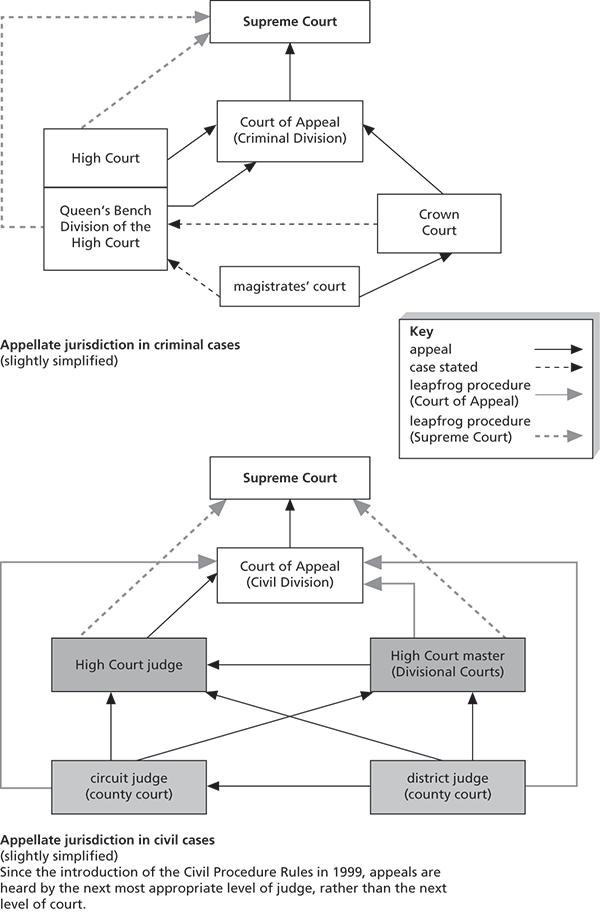appellate jurisdiction
The power of a judge to hear appeals from a previous court decision. Appellate jurisdiction in the criminal courts is determined by the nature of the offence. In the case of a summary offence, appeals by the defendant against conviction and/or sentence in the magistrates’ court are to the Crown Court. Appeals from magistrates’ courts are to the High Court or Divisional Court of the Queen’s Bench Division if an appeal by the prosecution or defence is by way of case stated on a point of law. Appeals from the Crown Court can also be by way of case stated but only if the Crown Court had previously heard the appeal from the magistrates’ court. Higher appeals are restricted to those from the High Court or Divisional Court on a point of law of general public importance. In the case of an indictable offence, appeals by the defendant against conviction and/or sentence in the Crown Court are to the Court of Appeal (Criminal Division). Reference to the Court of Appeal may also be made (1) by the Attorney General due to an unduly light sentence, (2) by the Attorney General on a point of law following acquittal (although the earlier acquittal will not be affected), or (3) by the Home Secretary for consideration following conviction. A further appeal to the Supreme Court by the defence or prosecution is only available on a point of law of general public importance and with permission.
Appellate jurisdiction in the civil courts was substantially revised as a result of the Access to Justice Act 1999. Part IV of that Act seeks to ensure that appeals are heard by the next most appropriate level of judge, rather than the next highest court, as was the position before the introduction of the Civil Procedure Rules. The Lord Chancellor is able “by order” to vary routes of appeal if he considers it appropriate; such an order is now in place in the form of the Access to Justice Act 1999 (Destination of Appeals) Order 2000.
A circuit judge in the county court is now able to hear appeals from the small claims track, provided that the judge sitting at first instance was a district judge. A single High Court judge is able to consider civil and criminal appeals in contempt of court cases; criminal appeals by way of case stated from magistrates’ courts and the Crown Courts; and civil appeals from High Court masters, district judges, and county court circuit judges. As an exception, civil appeals from High Court masters, district judges, and county court circuit judges will be to the Court of Appeal if the previous court matter was either (1) a final decision made in a multi-track claim or in specialist proceedings or (2) an appeal itself from a county court judge. Two or more High Court judges sitting as a Divisional Court may also hear appeals. In the Chancery Divisional Court, appeals may be heard from certain tribunals and from the county courts for such matters as bankruptcy appeals. In the Family Divisional Court, appeals may be heard from the magistrates’ courts and the county courts, typically in respect of financial provision in cases of divorce and separation. In the Queen’s Bench Divisional Court, appeals may be heard from the magistrates’ courts, the Crown Court, and various tribunals by way of case stated and in matters of judicial review and habeas corpus. The Court of Appeal (Civil Division) is able to hear appeals from the county courts by way of the leapfrog procedure (Court of Appeal) and appeals from the High Court and various tribunals. The Supreme Court will hear appeals primarily from the Court of Appeal but can hear appeals from the High Court under the leapfrog procedure (Supreme Court).
Before the UK left the European Union in 2020, it was subject to the jurisdiction of the European Court of Justice (ECJ), which in matters of European Community law has the authority to overrule any national court, criminal or civil, in member states. The ECJ’s general jurisdiction over the UK ended with the expiry of the post-Brexit implementation period on 31 December 2020, although its jurisdiction continues in several special areas under the UK–EU Withdrawal Agreement. Individuals, groups, or organizations who consider themselves to be victims of a breach of the European Convention on Human Rights, and who have failed to find a remedy in the national courts, may still appeal to the Court of Human Rights in Strasbourg, as this is not an institution of the EU.

- livestock
- living apart
- living instrument
- living memory
- living on immoral earnings
- living together
- living will
- Lloyd’s
- loan capital
- loan creditor
- loan relationship
- local Act
- local authorities and children
- local authority
- local authority foster parents
- local government
- local government area
- Local Government Ombudsmen
- local land charge
- Local Land Charges Register
- local laws
- local lottery
- Local Safeguarding Children Boards
- lock-out agreement
- locus in quo